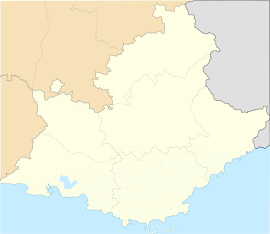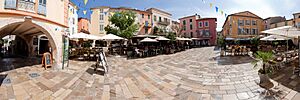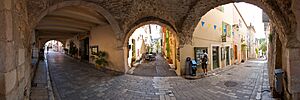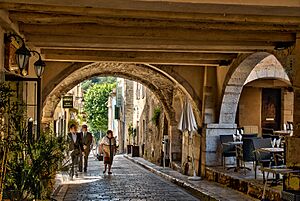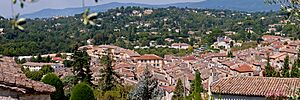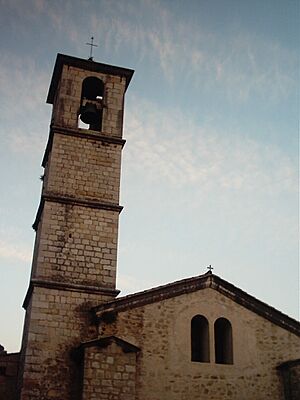Valbonne facts for kids
Quick facts for kids
Valbonne
|
||
|---|---|---|
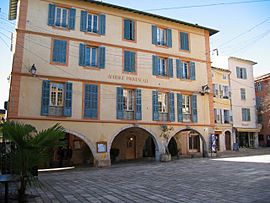
Main square
|
||
|
||
| Country | France | |
| Region | Provence-Alpes-Côte d'Azur | |
| Department | Alpes-Maritimes | |
| Arrondissement | Grasse | |
| Canton | Valbonne | |
| Intercommunality | CA Sophia Antipolis | |
| Area
1
|
18.97 km2 (7.32 sq mi) | |
| Population
(2021)
|
12,754 | |
| • Density | 672.32/km2 (1,741.3/sq mi) | |
| Demonym(s) | Valbonnais | |
| Time zone | UTC+01:00 (CET) | |
| • Summer (DST) | UTC+02:00 (CEST) | |
| INSEE/Postal code |
06152 /06560
|
|
| Elevation | 75–302 m (246–991 ft) (avg. 200 m or 660 ft) |
|
| 1 French Land Register data, which excludes lakes, ponds, glaciers > 1 km2 (0.386 sq mi or 247 acres) and river estuaries. | ||
Valbonne is a town, also called a commune, located near Nice in southeastern France. It's part of the Alpes-Maritimes area in the Provence-Alpes-Côte d'Azur region. The name Valbonne means "the good valley" in the local language, Provençal. It's also known as "Vaubona" in Occitan.
Valbonne is part of a group of towns called the Communauté d'agglomération de Sophia Antipolis. A big part of the Sophia Antipolis technology park is located right here in Valbonne.
Contents
Exploring Valbonne's Location
Valbonne is in a valley, right by the Brague river. The town is split into two main parts:
- The old village, which is in the far northwest.
- Sophia Antipolis, located to the east, near the areas of Haut-Sartoux and Garbejaïre.
Understanding Valbonne's Weather
Valbonne has a mild climate. On average, it gets about 2.5 days a year where the temperature drops below freezing (0°C or 32°F). It also has about 20.5 days a year where the temperature goes above 30°C (86°F). The hottest day ever recorded was 37.6°C (99.7°F) in August 2003. The coldest day was -3.3°C (26.1°F) in February 2012.
A Journey Through Valbonne's Past
People have lived in the Valbonne area for a very long time, even before history was written down.
- Ancient Times: We've found old tools like stone axes from the Neolithic period (New Stone Age). There are also funeral urns from the Bronze Age and pieces of Roman pots. You can even see parts of an old Roman aqueduct from the 3rd century A.D.
- Middle Ages: In the year 1199, the bishop of Antibes gave this land to an abbey (a type of monastery). Monks then built the Abbey of St. Mary here. They called the area Vallis Bona, which means "the good valley." This is where the name Valbonne comes from.
- Challenges and Changes: During the late Middle Ages, wars, dry weather, and a terrible sickness called the Black Death in 1351 caused many people to leave. The abbey and the surrounding area became empty.
- A New Beginning: In 1486, the region became part of France. This led to a new start for Valbonne. The village we see today was founded in 1519 by Augustin de Grimaldi, who was both a bishop and an abbot. He wanted to bring people back to the area. He hired Italian craftspeople to build the village using local clay.
How Valbonne Village Was Designed
The village of Valbonne was built in a special way.
- Grid Pattern: It's laid out like a grid, similar to old Roman military camps. It has two main streets that cross each other, and the main square (like a forum) is where they meet.
- Place des Arcades: In the 17th century, covered walkways called arcades were added to the central square. This square is now famous as la Place des Arcades.
- Unique Style: Unlike many other villages in the South of France that are built in spirals around hills, Valbonne's flat, grid-like design is quite unique.
- Modern Growth: The village took over a century to build and stayed mostly the same until the mid-1900s. While the population of Valbonne has grown a lot recently, the old village still looks much like it did in the 16th century. The building of the Sophia Antipolis technology park in the 1970s also changed the area a lot.
Valbonne's Economy and Technology
While the old village of Valbonne has kept its historic look, the area nearby is home to a very modern place: Sophia Antipolis.
- High-Tech Hub: Sophia Antipolis is a big technology park, built in the 1970s. It was named after an ancient Greek colony called Antipolis, which was near the town of Antibes.
- Growth of Research: At first, companies interested in oil and mining came here. But then, the University of Nice moved some of its campus to the area in the 1980s. This made Sophia Antipolis a very important place for research and development.
- International Community: Today, Sophia Antipolis is a well-known international community. It has over 1,000 companies and employs more than 25,000 people. It covers a huge area of 2,500 hectares, spreading across Valbonne and nearby towns like Antibes, Biot, Mougins, and Vallauris. It continues to grow, with more towns joining in.
Who Lives in Valbonne?
The people who live in Valbonne are called Valbonnais or Sophipolitains. The population has grown quite a bit over the years:
| Historical population | ||
|---|---|---|
| Year | Pop. | ±% p.a. |
| 1968 | 1,878 | — |
| 1975 | 2,264 | +2.71% |
| 1982 | 3,918 | +8.15% |
| 1990 | 9,514 | +11.73% |
| 1999 | 10,746 | +1.36% |
| 2007 | 11,874 | +1.26% |
| 2012 | 12,619 | +1.22% |
| 2017 | 13,325 | +1.09% |
| Source: INSEE | ||
Places to See in Valbonne
The Old Village's Architecture
The houses in Valbonne's old village were built in a very strict way, just like the streets.
- House Design: Originally, all the houses looked the same. The ground floor was for deliveries (now it's often half-underground because the street level has risen). The first floor had the living room, and above that were the bedrooms. The attic was used for storage, and people would use a pulley to lift things up there. You can still see some of these pulleys today!
- Town Hall: On the main street, you'll find the old town hall with its tower and a fountain. It was built in the 19th century.
The Abbey-Church
- History: The beautiful Romanesque abbey-church was built in the 13th century by Benedictine monks. When the village was founded, it became the main church for the community.
- Unique Style: It's a great example of Chalaisien architecture, which is very similar to the early Cistercian style. The clock tower was added later, in the 19th century.
- Monastic Buildings: The old monastic buildings are still well-preserved. They've been restored since the 1970s and now house the "Le Vieux Valbonne" Heritage Museum. This museum shows many everyday items from the village's rural past and tells the story of Valbonne and the Chalais monastic order.
Learning in Valbonne: Schools
Valbonne has many schools for different age groups:
- Preschools: Daudet, Garbejaïre, Île Verte, Sartoux
- Elementary Schools: Campouns, Garbejaïre, Île Verte, Sartoux
- Junior High Schools: Collège Niki de Saint Phalle, Collège de l’Éganaude
- Senior High School: Lycée Simone Veil
- International Center: Centre International de Valbonne (CIV)
There's also a part-time Japanese supplementary school, the École Complémentaire Japonaise de la Côte d'Azur, which is held at the CIV.
Famous People from Valbonne
- Joseph Bermond: An important former Mayor of Valbonne.
- Pierre Paul Laffitte: A scientist and politician who helped create Sophia Antipolis.
See also
 In Spanish: Valbonne para niños
In Spanish: Valbonne para niños
 | Jewel Prestage |
 | Ella Baker |
 | Fannie Lou Hamer |




